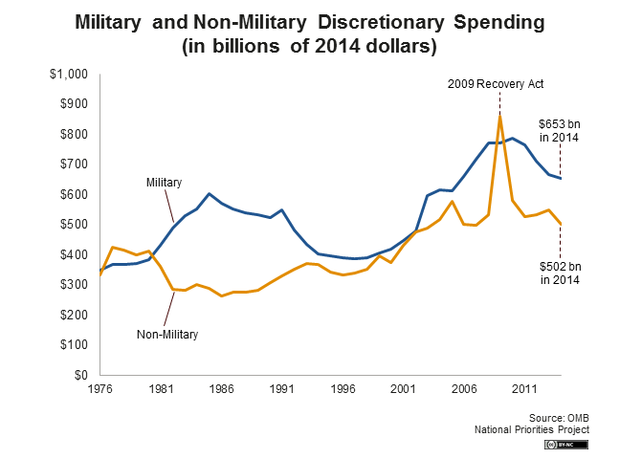Military Spending Fact Sheet
Aug. 1, 2013 - Download PDF Version
What Americans Say
We spend planeloads of money on the wars and, supposedly, to rebuild countries; big skids that you have to forklift around, loaded with hundred-dollar bills. That's my tax money.
Waryne (Independence, MO)
Key Facts
Total Security Spending
The U.S. has spent more than $8 trillion on national security since Sept. 11, 2001. That includes funding for the Department of Defense, the U.S. nuclear weapon stockpile, wars in Iraq and Afghanistan, and homeland security.
Military Funding in Context
Funding for the military is projected to account for around 17 percent of the total federal budget in fiscal 2014, and 57 percent of the discretionary budget. The discretionary budget is spending that lawmakers determine each year in the appropriations process.
War Costs
President Obama proposes spending $79.4 billion in fiscal 2014 to fund war operations in Afghanistan and Iraq; by way of comparison, the president’s 2014 budget allocates a total of $65 billion for all federal education programs. Through fiscal 2013, an inflation-adjusted $1.65 trillion has been spent on the two wars.
U.S. and the World
In 2012, the U.S. accounted for 39 percent of global military spending, while Iran, North Korea and Syria accounted for less than 1 percent, according to SIPRI, a Swedish research institute that tracks global military spending.
What's Happening Now
Committees in both the House and Senate voted to increase military funding in fiscal 2014, a move that could necessitate additional cuts to domestic programs in order to keep overall spending within mandated spending caps. The House proposed offsetting a 5 percent increase in military spending with an 18.6 percent cut to Labor, Health and Human Services, and Education.

What to Ask Your Legislator
On average the American public wants to reduce military spending by around 18 percent, according to research by the Center for Public Integrity and reported in the Washington Post. Meanwhile lawmakers of both parties have voted to increase military spending in 2014. Where do you come down on this issue?